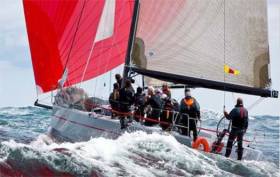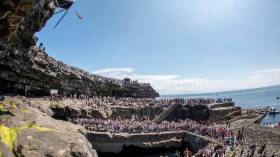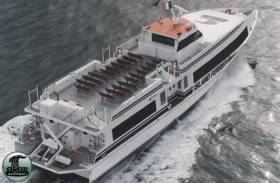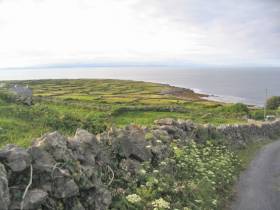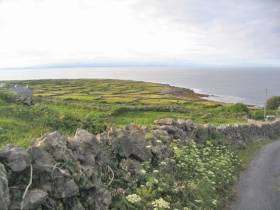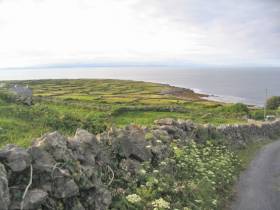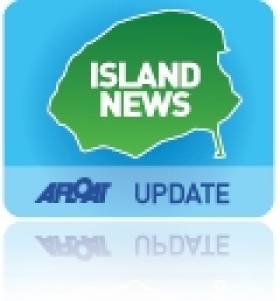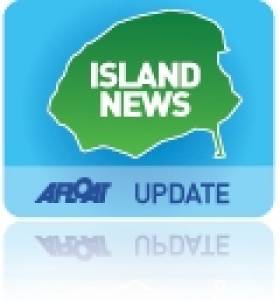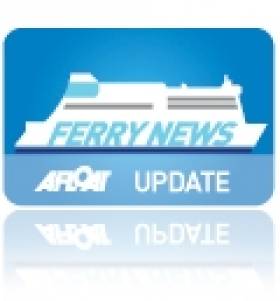Displaying items by tag: Inis Mor
Did Failed Seacock Sink Inis Mor?
While everyone is very relieved and grateful that the crew of the Scottish-owned Ker 39 Inis Mor were saved after their boat sank at the Saltees at the weekend while on passage to Cork for the up-coming ICRA Nationals, there is still a sense of shock that a boat which was a successful veteran of three Round Ireland Races should have gone down so suddenly writes W M Nixon.
Inis Mor is best known in Irish sailing for her years campaigned by the Gouy family of France, who won an RORC Championship with her thanks to their overall win in the 2012 Round Ireland Race. She was always in the frame, as her other two circuits of Ireland notched her a second and a third. And her gallant owners further endeared themselves to the Irish sailing community through being entered for the Round Ireland Race as representing the Clifden Boat Club, as they have a property in Connemara.
Inis Mor was sold to top Scottish skipper Jonathan Anderson, whose own formidable track record at the sharp end of the fleet made the Anderson/Inis Mor equipe’s debut in Cork a keenly-anticipated event. Thus the news of this sinking, apparently caused by a failed toilet seacock with an ingress of water which was not obvious until it was too late to do anything to effectively seal it off, brings a sense of shock, and an added awareness that in a stripped-down racing boat, almost any equipment failure can have cumulative and potentially disastrous effects if not immediately dealt with.
Cliff Diving World Series Returns To Aran Islands In 2017
#CliffDiving - The Red Bull Cliff Diving World Series returns to Poll na Péist this summer, as the Offaly Express reports.
Also known at the Serpent’s Lair, the spectacular blowhole in the Aran Islands last hosted cliff diving’s top flight in June 2014.
Saturday 24 June will mark the third visit of the global tour to the islands since 2012, and is just one of six stops worldwide in the 2017 competition.
Reigning men’s and women’s champs Gary Hunt from the UK and Australia’s Rhiannan Iffland are expected to lead the cream of the sport to Inis Mór for the first stage of the new season before stops in Portugal, Italy, Texas, Bosnia and Chile.
The Offaly Express has more on the story HERE.
Inis Mór Ferry Operator Makes Deal To Halve Passenger Levy & Resume Winter Service
#AranIslands - The deadlock over Inis Mór’s winter ferry service appears to be over, after the ferry operator agreed to continue absorbing the costs of the council-imposed passenger levy.
According to Galway Bay FM, Island Ferries Teo’s proposal to reduce the levy both retroactively to 2012 and from 2017 onwards has been approved by Galway County Council.
The operator had halted services to the largest of the Aran Islands at the end of November, citing “negative fiscal conditions” that it said were a consequence of the 80c passenger levy.
It’s now emerged that half of the company’s €500,000 debt to the council will be written off, not counting upwards of €450,000 in court costs.
Sailings were restored within days on a temporary basis as talks between the company, Galway County Council and the Department of the Gaeltacht resumed earlier this month.
It’s now expected that winter sailings to and from the island will continue beyond the revised 4 January end date.
Operator Pulls Inis Mór Winter Ferry Service
#AranIslands - Ferry services to the mainland from the largest of the Aran Islands will be suspended till March from tomorrow following a last-ditch effort to extend winter sailings.
As previously reported on Afloat.ie, Inis Mór residents were guaranteed their ferry till the end of today (Wednesday 30 November) pending a Galway County Council meeting this week to discuss a long-running dispute over passenger levies.
However, ferry operator Island Ferries Teo has now confirmed to Galway Bay FM that it will withdraw the island's winter service to from tomorrow (Thursday 1 December) till 17 March next year, citing “negative fiscal conditions”.
Aran Islands Ferry Service Extended By Fortnight
#AranIslands - Inis Mór residents have a guaranteed ferry service for two more weeks pending talks over the operator’s planned withdrawal from the island till spring.
Island Ferries Teo confirmed to Galway Bay FM that services from the Galway mainland to the largest of the Aran Islands would continue till Thursday 1 December, two weeks from today (Thursday 17 November).
That’s two days after Galway county councillors are scheduled to discuss the company’s ongoing dispute over passenger levies on 28 November.
As previously reported in Afloat.ie, the ferry operator intends to suspend its “commercially unsustainable” Inis Mór winter service till mid March next year unless the issue of levies is addressed.
Inis Mór Ferry Services Suspended Till Spring Over Levy Dispute
#AranIslands - “Policy decisions beyond our control” have been cited by Island Ferries Teo for its suspension of services between the mainland and the largest of the Aran Islands from November till next spring, as Galway Bay FM reports.
The move follows a long-running dispute over a council-imposed passenger levy for the non-PSO ferry route to Inis Mór that’s been subject to sharp fare increases over a number of years.
Earlier this year a deal was reached to extend ferry services to the island that were slated to end in January, after a Supreme Court ruling that forced the company to pay landing charges, according to TheJournal.ie.
However, the company now says it has reached an impasse with the Government and Galway County Council and had been left with no course of action other than to suspend the “commercially unsustainable” winter service.
TheJournal.ie has more on the story HERE.
Reprieve For Inis Mór As Ferry Service Continues Into Spring
#FerryNews - Aran Island Ferries has confirmed it will continue sailings between Inis Mór and the mainland after meeting with Government officials on Tuesday evening (26 January).
As previously reported on Afloat.ie, Galway councillors had been seeking a solution to the Aran Islands transport crisis as the non-PSO ferry route was set to end this Sunday over a long-running passenger levy dispute.
But as Galway Bay FM reports, a deal has now been reached to keep ferries running across Galway Bay between Rossaveal and Kilronan into the spring, which entails a subvention from the Department of the Gaeltacht – though the 80c passenger levy remains an issue.
In other news, Galway County Council has denied claims that it is taking legal action against the Department of the Gaeltacht over an alleged €7 million debt related to harbour works on Inis Mór and Inis Meain.
Galway Bay FM has more on the story HERE.
#CliffDiving - British diver Gary Hunt trounced the competition at the weekend's Red Bull Cliff Diving World Series leg at the 'Serpent's Lair' in the Aran Islands.
As previously reported on Afloat.ie, the extreme sports event was making its long-awaited return to Ireland after wowing the crowds on Inis Mór two years ago, bringing the cream of the world's cliff diving talent such as living legend Orlando Duque, who led the field after Saturday's qualifying round.
But it was Hunt who would triumph on the Sunday with an impressive series of dives, including the highest-scoring single dive of the day - erasing memories of his poor performance at the Aran Islands blowhole in 2012.
The win also means that Hunt is 150 points in the lead in the series standings as the crew head to Norway for the next leg of this year's championship tour.
Red Bull has much more on the story HERE.
#CliffDiving - The Red Bull Cliff Diving World Series will make its long-awaited return to Ireland this summer after dazzling spectators in the Aran Islands two years ago.
As the Belfast Telegraph reports, reigning champion Artem Silchenko and cliff diving's living legend Orlando Duque will be among those testing their mettle with the 27-metre dive into the Serpent’s Lair blowhole at Inis Mór on Sunday 29 June.
Also known as Poll na Peist, it's a spectacular dive described by Duque as one of the highlights of his career.
The Serpent's Lair will be the third stop in the 2014 Red Bull Cliff Diving World Series that began this past weekend in Havana, Cuba, where British diver Blake Aldridge went top of the table with 200 points in a huge upset victory.
Winter Ferry To Inis Mór Could Be No More
#AranIslands - Galway Bay FM reports on fears that winter ferry services to Inis Mór in the Aran Islands might end due to lack of Government funding.
Galway Senator Fidelma Healy Eames raised the issue in the Seanad last week, telling how the Galway Bay islanders have been lumped with travel and fare increases since the ceasing of a State-subsidised contract for Inis Mór's passenger ferry, and the failure to receive tenders for a new five-year contract.
It's already been reported that ferry visits to the Aran Islands have fallen by 20% in six years.



























